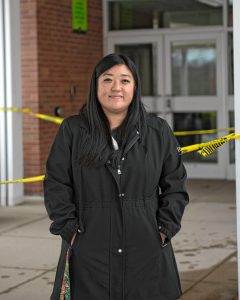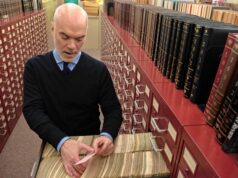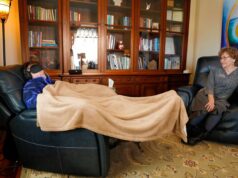
Schools across the state, country and the globe are closed amid the coronavirus pandemic. Here in Massachusetts, though schools are slated to reopen at the beginning of May, they’re now closed per Gov. Charlie Baker’s order. In the meantime, local educators in the Pioneer Valley are interacting remotely with students on a daily basis and are concerned about issues such as equitable access to technology for students and how the pandemic will impact their schools in the future.
Being flexible, accommodating in adjusting to change: Kristen Smidy
Principal of Hampshire Regional High School — Westhampton
At Hampshire Regional High School (which includes students from Westhampton, Southampton, Williamsburg, Goshen and Chesterfield), Principal Kristen Smidy recognizes that there’s a disparity between students who have access to the internet and online technologies during the coronavirus pandemic, and those who do not.
“We have some towns in our community that don’t even have internet access,” she explained. “So, not only is it a socioeconomic issue, but it’s also an issue of availability, accessibility and equity.”
To address this problem while students aren’t attending school, Hampshire Regional has sent digital and physical copies of enrichment work to students that doesn’t count toward their grade, but is a review of previous learning, Smidy said.
“Some families want more work; some families are struggling with the work that’s assigned,” she said. “It’s really just about being flexible and accommodating to make sure that we’re doing everything that we can, but not overwhelming them at the same time.”
This past Sunday, she received a newsletter from high school teachers about the different activities that educators are providing while schools are closed.
“This week we’re having teachers call students in their advisory, not for academic purposes, but just for a wellness check,” she said. “As we adjust to this change, it’s certainly socially and emotionally challenging as well as academically challenging. But teachers are being really creative and awesome. I was in a conversation with some science teachers around having students do some gardening and trying to figure out how that could be a cool interdisciplinary activity.”
For Smidy and other administrators at the regional high school, there’s been an emphasis on communicating with the local boards of health in each town regarding the coronavirus.
“I know that boards of health are challenged with trying to assess who is symptomatic in their community — how to support schools with communicating about people who are symptomatic, but who haven’t been tested,” she said. “This is all kind of unprecedented. So there’s not a rule book in terms of informing the community if someone has had contact with someone else who has had contact with someone who’s symptomatic.”
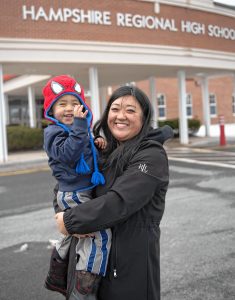
Kristen Smidy, the principal of Hampshire Regional, stands with her son Andrew Smidy in front of the school.
Right now, it’s mainly up to local administrators to manage their schools or school district during the coronavirus crisis, she said. But for the future, Smidy hopes that if school is suspended for the remainder of the year, they would receive some guidance from the state about how to move forward.
“The issues of equity and access are real,” she said. “But if we’re only handling situations within our own district, there’s still a bigger-scale issue of equity. If Hampshire Regional is doing something one way and Boston Public Schools are doing something another way and have a different set of expectations, then when our students go into college or even next year to the school year, students are going to be in a variety of different places.”
Keeping up connection with her students: Sadie Cora
Third grade teacher at Jackson Street Elementary School — Northampton
For Sadie Cora, a third grade teacher at Jackson Street Elementary School in Northampton with a classroom of 23 students, the disruption of her professional life and educational community due to the coronavirus has been a challenge.
“I’m home, my daughter is school age, so I’m home and trying to find normalcy and stay connected to my class,” explained Cora, who also is president of the Northampton Association of School Employees. “Change is hard and it’s a really big change.”
Despite being an educator herself, Cora doesn’t think she can fill the role of her 5-year-old daughter Alice’s kindergarten teacher.
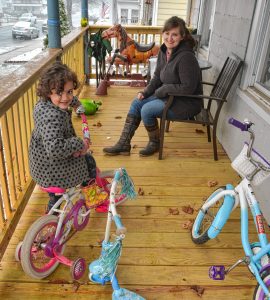
Sadie Cora, who is a third grade teacher in Northampton, with her daughter, Alice, 5, at their home in Holyoke, Monday, Mar. 23, 2020.
“As a parent myself, I can focus on creating a sense of safety and routine for my daughter, but know that I don’t have the expertise that her kindergarten teacher has. And I don’t expect to replace school with what’s happening at home because as an educator, I believe that learning at school is social and it happens with kids and their educators together having experiences.”
She’s focusing on spending time with her daughter and dedicating time for activities they normally wouldn’t have much time to do together, such as spending time outdoors.
Whether school returns to session at the beginning of May or at a later date, as a teacher she’s going to need to find a new baseline curriculum in terms of educating her students.
“I am working on that,” she said. “I hope that families don’t have to take on curriculum in a way that they’re not prepared to do because I really hope that’s not what the circumstance calls for.”
She is communicating regularly with her students’ families and has provided them with pencil and paper worksheet packets while the school is closed.
“I’ll be available if they have questions or mostly just to reach out to them to see if they’re OK and their spirits are up, and to keep up the connection for whenever we go back,” Cora said.
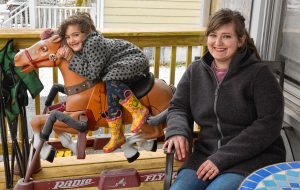
Sadie Cora, who is a third grade teacher in Northampton, with her daughter, Alice, 5, at their home in Holyoke, Monday, Mar. 23, 2020.
She believes expecting students to learn remotely for the foreseeable future is an equity issue.
“There’s kids that can’t access that, kids who need learning accommodations, families that can or can’t support kids in doing that,” Cora said. “I’ll wait for guidance on that, but I would urge caution on us thinking that we can just transition to online learning and have it be equitable.”
Keeping students, parents engaged is the important thing: Luis Soria
Principal of Dr. Marcella R. Kelly Elementary School (K-4; 7-8) — Holyoke
In Holyoke, Luis Soria, principal of the Dr. Marcella R. Kelly Elementary School, said his district has been thinking about how equitable access to technology isn’t always a given.
Before the coronavirus pandemic, teachers were updating parents, via phone calls and an online application called ClassDojo, about their children’s schoolwork, while also providing learning resources and hard copies of learning materials.
While the school is closed, teachers at his school are also finding creative ways to engage with students via a new website launched by the district, called www.hpsathome.com.
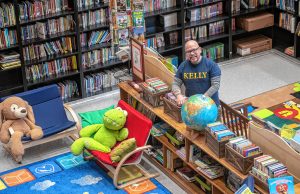
Luis Soria, principal of Dr. Marcella R. Kelly School in Holyoke, stands in the school’s normally bustling library on Wednesday, March 25, 2020. When the morning bell rang during the photo session, Soria remarked, “A bell for no-one.”
“Teachers are uploading there starting this week,” Soria said. “You can see some examples of the kind of the work that teachers are including by school, grade level and teacher. Also videos of enrichment activities, exercise, for example — our P.E. teacher has been sending out videos of a daily exercise for the day. It’s been a big hit. The kids have been replying to me saying, ‘This is so much fun.’ ”
Soria said he’s also filmed himself reading books aloud that ties into his academic “purpose of the day,” which is being shared not only on the website, but via social media as well.
Right now, Soria is taking his work as an educator one day or one hour at a time as news regarding the coronavirus pandemic is quickly changing.
“What I’m proud of in my district is consistent communication about how we could be better prepared; how we could better reach out to families,” he explained. “We are working diligently now at providing devices — Chromebooks — to students that don’t have it.”
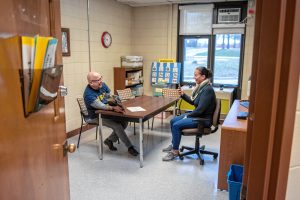
Dr. Marcella R. Kelly School Principal Luis Soria, left, and assistant principal Michelle Hernandez rehearse a reading of “Chato’s Kitchen”, by Gary Soto and Susan Guevara, in the office of the Holyoke elementary on Wednesday, March 25, 2020. Each day since schools have closed Soria tapes a video of himself reading a book aloud and posts it to the school’s PTO Facebook site.
The district is also asking families whether they have a device for students to access the internet as well as if they have internet access, he said.
Soria also said it isn’t an easy thing to ask parents to fill the role as educators during the current crisis.
“Our messaging has been, ‘Have the right balance,’ ” he said. “Here’s some enriching and engaging activities for your child to complete. And enjoy it. Enjoy time with your kids and learning with them. You’re not expected to take over.”
Kelly Elementary, like many schools in the city, has a large percentage of students who speak Spanish as their first language, Soria said, and his school is trying to provide resources and language accessibility to all students, whether that’s teachers speaking Spanish to communicate with parents or online resources in Spanish.
“There’s a language option even on the website,” he said. “So we have Spanish language parents that say, ‘Well, I do want to access some of these online enrichment activities, but I can’t read English.’ Just click on the button that indicates Spanish and you’ll be able to find what’s there for you as well. It’s imperfect for sure, but we are striving to do our best for Spanish language families.”
Trying to ensure equitable access to learning: Jean Fay
Special education paraeducator at Crocker Farm Elementary School — Amherst
For more than two decades, Jean Fay has worked as an educator at Crocker Farm Elementary School in Amherst. She’s a special education paraeducator for fourth grade students, now in her 22nd year at the school.
Amid the coronavirus pandemic, one of the most important issues for schools is equitable access to school resources and technology, Fay said.
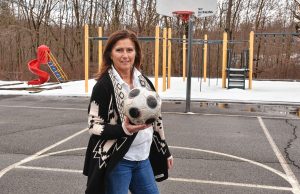
Jean Fay, who is a special education paraeducator at Crocker Farm School in Amherst, stands on the school’s empty playground, Tuesday, Mar. 24, 2020. She said her students liked to play soccer there.
“That’s a huge concern for me as someone who works with students that need additional support in the classroom to access the curriculum,” she said. “So, my job as a special education paraeducator is to basically scaffold the lesson that the classroom teacher is learning so my students can better grasp the concepts, which is difficult to do remotely, as you can imagine. Everything is being reinvented hour by hour in public education.”
Fay said the union leadership has been meeting with administrators to ensure there’s equity across the Amherst-Pelham Regional School District (which includes the towns of Amherst, Pelham, Leverett and Shutesbury).
“We’re ensuring that in every building there’s equity in the way that lessons are being delivered to students,” she said. “Everyone’s trying to invent something as quickly as they can on short notice. To be honest with you, I’m amazed at what I’ve seen my colleagues come up with.”
She added that a sixth grade teacher in her school has been personally calling students to have conversations.
“I’m seeing colleagues that have musical talents record videos of themselves,” she said.
One of the most important aspects of Fay’s work as a paraeducator at the school is forming bonds of trust with her students, she said.
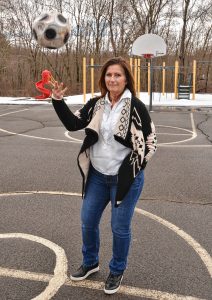
Jean Fay, who is a special education paraeducator at Crocker Farm School in Amherst, stands on the school’s empty playground, Tuesday, Mar. 24, 2020. She said her students liked to play soccer there.
“It’s really important to have that bond with kids,” she said. “My way of continuing that relationship is — I put up daily messages to the students. I have also reached out through a parent of my student to let them know that I’m thinking about them and how they’re doing. Continuing that relationship is going to be crucial to all of our students.”
Fay said she thinks parents shouldn’t try to emulate a regular school day every day during the coronavirus pandemic.
“We get so reliant on technology, but just picking up a book is way underrated,” she noted.
The last thing her students and others need are standardized tests if the school year doesn’t resume, Fay said.
“They need to know that there are a lot of adults in the world that care about them,” she said of her students. “Their teachers care about them … And we’ll be here when they come back to school.”
Chris Goudreau can be reached at [email protected].

